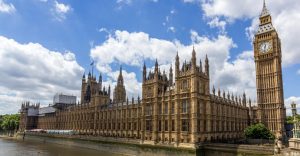Thematic Research Leads: Climate/Environment; International Affairs/Defence; Parliament, Public Administration and Constitution | 1 August 2022
Some very exciting news from Parliament – the Economic and Social Research Council (ESRC), POST and Parliament’s Knowledge Exchange Unit have launched new (paid!) roles for researchers keen to be involved in policy. The new Thematic Research Leads (TRLs) are aimed at mid-career university researchers who will work for three days per week (0.6 FTE) to place research evidence at the heart of UK Parliament through a pilot thematic policy hub of parliamentary staff. Colleagues undertake this role whilst retaining their substantive academic post for the remaining two days per week.
Thematic Research Leads will work alongside POST, library and select committee staff at UK Parliament to help ensure the best available research evidence feeds into scrutiny, legislation and debate. They will also strengthen and diversify connections between Parliament and the research community. The roles are funded by ESRC, appointees are expected to commence their role in January 2023. Details:
- Thematic Research Lead on Climate and Environment.
- Thematic Research Lead on International Affairs and Defence.
- Thematic Research Lead on Parliament, Public Administration and Constitution.
This webpage contains more information on the Thematic Research Lead Call, the shared ambitions of POST and the ESRC for this activity, and information on how to apply.
POST state: We really encourage applications from everyone regardless of their ethnicity, race, gender, religious beliefs, sexual orientation, age, marital status or whether or not they have a disability.
Colleagues who would need flexibility or hybrid working are encouraged to apply – POST are a flexible employee, are committed to support diversity and their employees, and will consider a range of requests to support colleagues to take up a post. Deadline: 1 August 2022
BU process for this opportunity
Because this is a funded position, RDS will need to treat your application in the way we normally would for any grant bid. With a submission deadline of 1 August, we look forward to receiving the completed e-ITBs by 4 July (for the costing request please attach an outline of how often you would want to travel, as this attachment is required).
You will need your Head of Department to agree in principle that you are able to commit 0.6FTE of your time if the application is successful and that we can arrange teaching replacement and funding, so please approach them as a first step. Full internal approvals will need to be completed by 26 July.
For guidance on the process please contact Beth Steiner and for any queries relating to the positions please contact Sarah Carter.
Finally the KEU outline why you should apply for this role:
“These roles, if proven, could become highly influential prestigious roles at the heart of Parliament, somewhat akin to the Government’s Chief Scientific Advisers, but shaped for a parliamentary context. The role offers an exciting opportunity for you to see first-hand how research feeds into policy, through shaping parliamentary work with your research expertise and participating in core parliamentary processes. You will be uniquely placed to build connections with parliamentary and government stakeholders to take forward through your career, and participation will provide you with rich and varied experiences to support you on an upward professional trajectory.”
 The Parliamentary Office of Science and Technology (POST) is inviting expressions of interest for its Parliamentary Academic Fellowship Scheme from Monday 8 June.
The Parliamentary Office of Science and Technology (POST) is inviting expressions of interest for its Parliamentary Academic Fellowship Scheme from Monday 8 June.










 Visiting Prof. Sujan Marahatta presenting at BU
Visiting Prof. Sujan Marahatta presenting at BU 3C Event: Research Culture, Community & Can you Guess Who? Friday 20 March 1-2pm
3C Event: Research Culture, Community & Can you Guess Who? Friday 20 March 1-2pm Beyond Academia: Exploring Career Options for Early Career Researchers – Online Workshop
Beyond Academia: Exploring Career Options for Early Career Researchers – Online Workshop UKCGE Recognised Research Supervision Programme: Deadline Approaching
UKCGE Recognised Research Supervision Programme: Deadline Approaching SPROUT: From Sustainable Research to Sustainable Research Lives
SPROUT: From Sustainable Research to Sustainable Research Lives ECR Funding Open Call: Research Culture & Community Grant – Apply now
ECR Funding Open Call: Research Culture & Community Grant – Apply now ECR Funding Open Call: Research Culture & Community Grant – Application Deadline Friday 12 December
ECR Funding Open Call: Research Culture & Community Grant – Application Deadline Friday 12 December MSCA Postdoctoral Fellowships 2025 Call
MSCA Postdoctoral Fellowships 2025 Call ERC Advanced Grant 2025 Webinar
ERC Advanced Grant 2025 Webinar Update on UKRO services
Update on UKRO services European research project exploring use of ‘virtual twins’ to better manage metabolic associated fatty liver disease
European research project exploring use of ‘virtual twins’ to better manage metabolic associated fatty liver disease